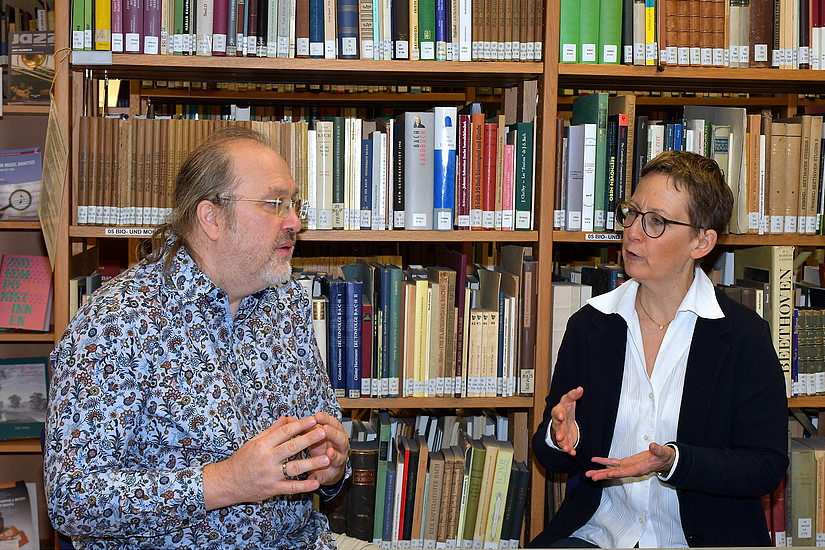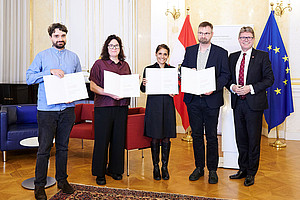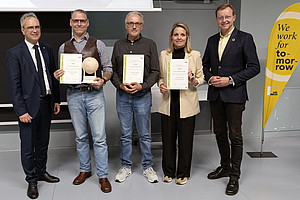The Anthropocene refers to the most recent epoch in climate and earth history. It bears this name in reference to the mark that humans have left. We are massively changing our natural environment, from the ground right up to the atmosphere. What does "radical thought" mean to you in this context?
Baumgarten:
Radical comes from the Latin word radix, root. We have to come back to this. Thinking critically, wildly and openly, consciously undermining, revising norms and fixed modes of thought. This also means to think in a more complex way: incorporating science, empathy, and emotions, rather than polarizations. Because reality is multifaceted.
Kogler:
We can see, for example, where viewing nature only as a resource for our own purposes leads us. Thinking radically means looking at what other ideas there are. Where can we tie in with other traditions, with quieter voices? The University of Graz is an ideal place to bring in many different perspectives. This is exactly what we want to do: initiate alternatives in theory and practice, together with colleagues from various disciplines in the humanities and cultural studies.
What could this mean in concrete terms of musicology?
Kogler:
To pick up on an idea from the critical theory of the Frankfurt School: the culture industry is interested in bringing standardised products onto the market that sell well, that are tailored to the supposed taste of the public. Nothing truly new is allowed. The focus is on consumption and superficial entertainment rather than on encouraging people to think critically about current problems. The question is: how can we find a way out of this profit-orientated system? How can art contribute to getting society as a whole out of this prison?
Are there any role models in this respect?
Kogler:
At the beginning of the 20th century, the Viennese School around Arnold Schönberg dissolved tonality with their new music, overturning traditional listening habits. It was difficult to consume, and thus defied marketing strategies. However, this placed it in the position of an outsider. How does art that develops counter-strategies to standardised consumption look like, without becoming too elitist? We need to find an answer to this question.
Mr Baumgarten, to what extent do ideologies and thought patterns influence the translation of one language into another?
Baumgarten:
Translation is always embedded in a socio-political, ideological context. Translating literature, for example, is often about inclusion or exclusion. In the USA, for example, a lot of what comes in from the outside is adapted to the North American target culture, while the foreign tends to be filtered out. For example, what constitutes an Austrian "Häferl" might not be of interest for a literary translation into English that needs to slot in seamlessly into a standardized market. This has to do with cultural power - some also say "soft power" - as well as with economic considerations. What does the target group like to read? What brings money? We in Europe, on the other hand, tend to uncritically accept everything that comes from the USA. This is particularly evident in films and TV series.
What consequences can such “coloured" translations have?
Baumgarten:
Especially when it comes to ideologies, the effects can be far-reaching. In the 1950s and 1960s, the complete works of Sigmund Freud were translated into English in such a way as to fit into the positivist thinking of psychology in the English-speaking world at the time. In other words, the translation was very scientific. Freud's more colloquial way of expressing himself in German was lost in the process, and generations of English-speaking psychologists were trained on the basis of a ‘scientised’ translation. Today, after the expiry of the copyright, new translations have rectified the situation.
It seems that digital technologies are taking over more and more areas of life. What does critical thought mean in this context?
Baumgarten:
A fundamental problem is that the development or implementation of digital technologies in society is completely undemocratic. And most of us don't realise it. To put it differently: the apparent realisation of some utopian dreams, such as overcoming the Babylonian confusion of languages through "perfect" translation machines, is taking place virtually behind our backs. We also have to implement new technologies in teaching at the university. But again, no one is asked whether they want to use AI, for example. Is that democratically legitimised? It is not.
Kogler:
In addition, the new technologies are very marginalising. On the one hand, for example, many people do not have access to them, because they can't afford it, or aren’t receiving assistance. On the other hand, everything is squeezed into patterns that accommodate the digital. That which is not online is no longer recognised.
How should we deal with the fact that AI decisions are also influenced by ideologies?
Baumgarten:
We need a new kind of literacy, a kind of "Critical AI Literacy", or skills to use AI critically. Since the triumph of ChatGPT, this has been at the top of the agenda in science as well as in politics. When it comes to machine translation, we are talking about the need for general "machine translation literacy". In other words, how do we deal with AI-generated material? What are the potential risks of machine translation? Social values are still being uncritically reproduced by machine translation systems. For example, most systems reproduce stereotypical role models. In the case of typical job titles for women and men, a "nurse" often becomes a "Krankenschwester", even if it is a man in the English original.
The project "Radical Thought in the Anthropocene" is part of a research focus area on the topic of ‘perception’ at the Faculty of Humanities at the University of Graz. What is the connection to radical thought here?
Kogler:
We are looking for answers to the question, how group-specific thought patterns and ideologies shape our perception. And how our perception can promote, or prevent, critical thinking. We believe that, on the way to a transformation of culture and our image of humanity, art can play an important role in establishing new ways of perception.
What role do you see for yourself and the university in terms of promoting critical thinking and action in society?
Kogler:
The first step is self-reflection. If we at the university only orientate ourselves towards capitalist principles and competitive thinking, then the students will carry this forward as well. However, if we manage to live a critical practice: that is a great contribution.




